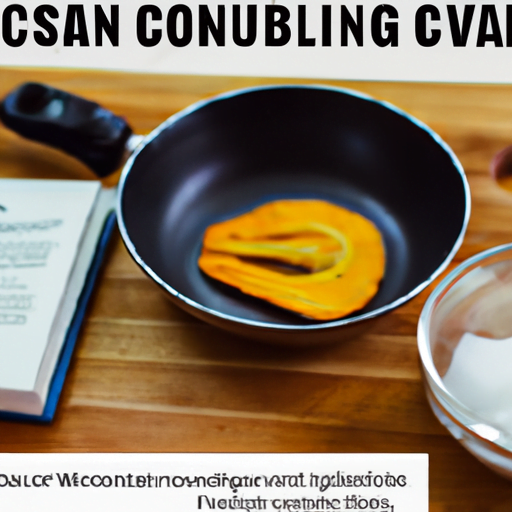So you’re interested in off-grid living? That’s awesome! Being self-sufficient and disconnected from the power grid can offer a sense of freedom and sustainability. But let me ask you, how can you cook without oil? We all need to eat, and oil is often a staple in many recipes. Well, don’t worry, because I’ve got some healthy cooking tips for you. And the best part? They’re oil-free!
Now, cooking without oil might sound strange at first, but trust me, it’s totally doable. In fact, it can be even healthier for you. By eliminating oil from your cooking, you reduce your intake of unnecessary fats and calories. Instead, you can use alternative methods to cook your food, such as steaming, sautéing with water or vegetable broth, or even baking.
In the upcoming article, you’ll learn more about the benefits of cooking without oil and get some delicious oil-free recipes. I’ll share some tasty ideas for breakfast, lunch, dinner, and even desserts that will satisfy your taste buds while keeping you healthy and off the grid. So, stay tuned and discover a whole new way to cook without oil. It’s time to get creative in the kitchen while embracing the simplicity of off-grid living.

Off Grid Living
Living off the grid refers to a lifestyle choice where individuals and families choose to live without dependence on public utilities such as electricity, water, and natural gas. This alternative approach to living involves generating one’s own energy, sourcing water locally, and adopting sustainable practices to fulfill basic needs. Off grid living provides various benefits, including a reduced dependency on external resources, environmental sustainability, financial savings, and greater freedom and autonomy.
Understanding Off Grid Living
Defining Off Grid Living
Off grid living means disconnecting from centralized utilities and relying on alternative sources of energy and resources. It involves living self-sufficiently and utilizing renewable sources, such as solar panels and wind turbines, to meet energy needs. By choosing to live off the grid, individuals can reduce their carbon footprint and have a more sustainable way of life.
Living Self-Sufficiently
Living off the grid requires individuals to be self-sufficient in meeting their daily needs. This includes generating electricity, managing waste, sourcing water, and growing food. Self-sufficiency is achieved through the use of renewable energy systems, rainwater harvesting, composting toilets, and sustainable agriculture practices.
Main Reasons for Choosing Off Grid Living
People choose off grid living for various reasons. Some individuals want to reduce their dependency on external resources and minimize their impact on the environment. Others embrace the freedom and autonomy that comes with living off the grid. Additionally, off grid living can offer financial savings in the long run, as it eliminates or reduces the cost of utilities.
The Benefits of Off Grid Living
Reduced Dependency on External Resources
One of the significant advantages of living off the grid is the reduced dependency on external resources. By generating their own energy and sourcing water locally, individuals are not affected by power outages or water shortages. This self-reliance provides a sense of security and independence.
Environmental Sustainability
Off grid living promotes environmental sustainability by utilizing renewable energy sources and adopting eco-friendly practices. Generating energy from solar or wind power significantly reduces carbon emissions and helps combat climate change. By reducing reliance on fossil fuels, individuals contribute to a cleaner and healthier planet.
Financial Savings
While the upfront costs of setting up an off grid system can be higher than connecting to public utilities, long-term financial savings can be significant. Generating your own energy means avoiding monthly electricity bills. Similarly, sourcing water locally saves money that would otherwise be spent on water bills. Over time, these savings can offset the initial investment and lead to financial independence.
Greater Freedom and Autonomy
Living off the grid offers a greater sense of freedom and autonomy. Individuals have control over their own energy production and consumption. They are not constrained by power outages, fluctuating energy prices, or water restrictions imposed by utility companies. This independence allows for a more self-determined and sustainable lifestyle.
Challenges of Off Grid Living
Limited Access to Basic Utilities
Living off the grid can present challenges in terms of limited access to basic utilities. Individuals have to find alternative ways to meet their daily needs. This includes finding alternative sources of energy, such as solar or wind power, and sourcing water from wells, rainwater harvesting, or other local sources.
Energy Generation and Management
One of the primary challenges of off grid living is energy generation and management. Individuals need to invest in renewable energy systems, such as solar panels or wind turbines, to generate electricity. Effective management and storage of energy are also essential to ensure a consistent power supply, especially during periods of low sunlight or low wind.
Water Supply and Conservation
Sourcing water can be a significant challenge when living off the grid. Individuals often have to rely on rainwater harvesting systems or wells to meet their water needs. Water conservation practices, such as using low-flow fixtures and reusing graywater, are crucial to maintain a sustainable water supply.
Food Storage and Preservation
When living off the grid, individuals must find alternative ways to store and preserve food. Without access to refrigeration or freezers, individuals may need to rely on canning, drying, or root cellars to extend the shelf life of perishable foods. Proper food storage and preservation techniques are essential to prevent spoilage and ensure a sufficient food supply.

Off Grid Cooking: The Oil-Free Approach
Why Avoid Oil in Off Grid Cooking
When it comes to cooking off the grid, adopting an oil-free approach offers several benefits. Firstly, it promotes a healthy lifestyle by reducing the intake of saturated fats and cholesterol present in most cooking oils. Secondly, by avoiding the need to rely on store-bought oils, individuals can preserve limited resources and reduce their dependency on external supplies. Lastly, an oil-free cooking approach aligns with the concept of self-sufficiency and sustainable living.
Understanding the Health Effects of Oil
Oil consumption has been linked to numerous health issues, including cardiovascular diseases, obesity, and inflammation. The high levels of saturated fats and cholesterol in cooking oils can lead to the development of plaque in arteries, increasing the risk of heart diseases. Additionally, the calorie-dense nature of oils contributes to weight gain and obesity. Furthermore, oils can trigger inflammation in the body, leading to various chronic diseases.
Exploring Alternative Cooking Methods
In oil-free cooking, alternative methods can be used to achieve delicious and healthy meals. Steaming and boiling are excellent techniques to cook vegetables while retaining their nutrients. Baking and roasting provide a crispy texture to food without the need for oil. Grilling and barbecuing add a smoky flavor to dishes without the added fats. Stir-frying and sautéing can be done using a small amount of water or vegetable broth instead of oil.
Oil-Free Recipes for Off Grid Living
There are numerous oil-free recipes that are perfect for off grid living. A delicious vegetable stir-fry can be made using a colorful array of vegetables, such as bell peppers, broccoli, and carrots, cooked with soy sauce and vegetable broth. Baked herb-roasted chicken can be achieved by marinating chicken in herbs and spices and baking it until tender and juicy. Grilled portobello mushroom burgers can be topped with fresh vegetables and condiments for a flavorful and satisfying meal. Steamed mixed vegetables with tofu provide a nutritious and protein-packed option for a wholesome dinner.
Conclusion
Transitioning to an oil-free off grid lifestyle offers numerous benefits, including a healthier diet, conservation of resources, and reduced dependence on external supplies. By exploring alternative cooking methods and experimenting with oil-free recipes, individuals can enjoy delicious and sustainable meals while embracing the advantages of off grid living. With a little creativity and adaptability, cooking without oil can be both a rewarding and enjoyable experience for those living off the grid. So, get ready to savor the flavors of an oil-free off grid lifestyle and take a step towards a healthier and more sustainable future.




